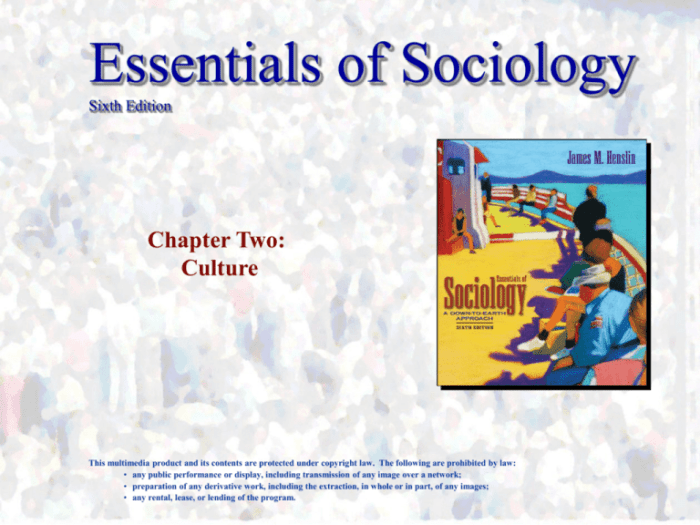Essentials of sociology 9th edition – Embark on a captivating exploration of the fundamentals of human society with Essentials of Sociology, 9th Edition. This comprehensive text delves into the core theoretical perspectives, research methodologies, social structures, and institutions that shape our social world, offering a profound understanding of the complexities and interconnectedness of social life.
From the foundational principles of functionalism to the transformative power of globalization, Essentials of Sociology, 9th Edition illuminates the intricate tapestry of social phenomena, empowering readers to critically analyze and engage with the ever-evolving dynamics of our social landscape.
Theoretical Foundations of Sociology
Sociology is a vast and complex field of study that encompasses a wide range of theories and perspectives. These theories provide different ways of understanding social phenomena, and they can be used to analyze a variety of social issues, from crime and poverty to education and healthcare.
Three of the most influential theoretical perspectives in sociology are functionalism, conflict theory, and symbolic interactionism. Each of these perspectives offers a unique way of understanding social life, and they have all been used to study a wide range of social phenomena.
Functionalism, Essentials of sociology 9th edition
Functionalism is a theoretical perspective that emphasizes the importance of social order and stability. Functionalists believe that society is a complex system of interconnected parts, and that each part plays a vital role in maintaining the overall stability of the system.
One of the key concepts in functionalism is the concept of social function. Social functions are the positive consequences that result from a particular social behavior or institution. For example, the family performs a number of important social functions, such as providing for the physical and emotional needs of its members, and socializing children into the norms and values of society.
Functionalists argue that all social institutions and behaviors serve some kind of social function. Even seemingly negative behaviors, such as crime and deviance, can serve a positive function by helping to maintain social order. For example, crime can help to clarify the boundaries of acceptable behavior, and it can provide a way for people to release their frustrations in a controlled setting.
Functionalism has been used to study a wide range of social phenomena, including crime, poverty, education, and healthcare. Functionalist studies have shown that these social problems are often caused by the breakdown of social institutions and norms.
Conflict Theory
Conflict theory is a theoretical perspective that emphasizes the importance of conflict and inequality in society. Conflict theorists believe that society is a場 of conflict between different groups and individuals, and that this conflict is the driving force behind social change.
One of the key concepts in conflict theory is the concept of social class. Social class is a system of stratification that divides society into different groups based on their economic resources and power. Conflict theorists argue that social class is the primary source of conflict in society, and that the interests of different social classes are often in direct conflict with each other.
Conflict theory has been used to study a wide range of social phenomena, including crime, poverty, education, and healthcare. Conflict theorists have shown that these social problems are often caused by the exploitation and oppression of one group by another.
Symbolic Interactionism
Symbolic interactionism is a theoretical perspective that emphasizes the importance of symbols and communication in social life. Symbolic interactionists believe that people interact with each other through symbols, and that these symbols shape our understanding of the world around us.
One of the key concepts in symbolic interactionism is the concept of the self. Symbolic interactionists argue that the self is not a fixed entity, but rather a product of our interactions with others. We learn who we are through our interactions with others, and our self-concept is constantly being shaped and reshaped by our experiences.
Symbolic interactionism has been used to study a wide range of social phenomena, including crime, poverty, education, and healthcare. Symbolic interactionist studies have shown that these social problems are often caused by the breakdown of communication and the loss of shared symbols.
Research Methods in Sociology

Sociologists employ various research methods to investigate social phenomena, each with unique strengths and limitations. These methods include surveys, experiments, and participant observation.
Surveys
Surveys involve collecting data from a sample of individuals through questionnaires or interviews. They allow researchers to gather information on a wide range of topics and reach a large number of respondents.
- Strengths:Efficient, cost-effective, generalizable to larger populations.
- Weaknesses:Limited depth of information, potential for bias due to self-reporting.
Example:A survey on voting behavior can provide insights into political preferences and trends.
Experiments
Experiments involve manipulating variables under controlled conditions to observe their effects. They allow researchers to establish causal relationships between variables.
- Strengths:High internal validity, ability to isolate and test variables.
- Weaknesses:Artificiality, limited generalizability, ethical concerns.
Example:An experiment on the effects of social media on self-esteem can manipulate exposure to social media and measure changes in self-perception.
Participant Observation
Participant observation involves immersing oneself in a social setting to observe and interact with participants over an extended period. It provides in-depth understanding of social interactions and cultural practices.
- Strengths:Rich, detailed data, insights into hidden aspects of social life.
- Weaknesses:Time-consuming, potential for bias due to researcher’s presence.
Example:A participant observation study of a gang can reveal the social dynamics, values, and norms within the group.
Social Structure and Inequality
Social structure refers to the organized patterns of social relationships and institutions that shape human behavior. It encompasses the ways in which individuals and groups are organized and connected within a society.
Major components of social structure include social class, race, and gender. Social class refers to the stratification of society into different socioeconomic levels, often based on factors such as income, education, and occupation. Race refers to the categorization of people based on physical characteristics, while gender refers to the socially constructed roles and expectations associated with being male or female.
Social Structure and Individual Behavior
Social structure significantly influences individual and group behavior. It shapes people’s access to resources, opportunities, and life chances. For example, individuals from higher social classes tend to have better educational attainment, higher incomes, and better health outcomes than those from lower classes.
Social Inequality
Social inequality refers to the unequal distribution of resources, opportunities, and power within a society. It can be based on various factors, including social class, race, gender, and other social categories.
Causes of Social Inequality
- Discrimination
- Prejudice
- Unequal access to education and employment opportunities
Consequences of Social Inequality
- Poverty and homelessness
- Health disparities
- Limited access to education and employment
- Social unrest and conflict
Social Institutions: Essentials Of Sociology 9th Edition

Social institutions are organized patterns of beliefs and behaviors that help a society meet its basic needs. They are the structures and mechanisms that govern how people interact with each other and with their environment. Social institutions provide a framework for social order and stability, and they help to shape individual and group behavior.Social
institutions have several major functions. They provide a sense of identity and belonging, and they help to socialize individuals into the norms and values of society. They also provide a means for social control, and they help to resolve conflicts and maintain social order.Social
institutions play a vital role in shaping individual and group behavior. They provide individuals with a set of expectations and guidelines for behavior, and they help to create a sense of shared purpose and identity. Social institutions also influence the way that individuals interact with each other, and they can shape the outcomes of social interactions.
Socialization
Socialization is the process by which individuals learn the norms and values of their society. It is a lifelong process that begins in childhood and continues throughout adulthood. Socialization occurs through a variety of channels, including the family, the school, the workplace, and the media.Social
institutions play a major role in socialization. They provide individuals with a set of expectations and guidelines for behavior, and they help to create a sense of shared purpose and identity. Social institutions also influence the way that individuals interact with each other, and they can shape the outcomes of social interactions.
Social Control
Social control is the process by which society ensures that its members conform to its norms and values. Social control can be formal or informal. Formal social control is exercised through laws and regulations, while informal social control is exercised through social pressure and sanctions.Social
institutions play a vital role in social control. They provide individuals with a set of expectations and guidelines for behavior, and they help to create a sense of shared purpose and identity. Social institutions also influence the way that individuals interact with each other, and they can shape the outcomes of social interactions.
Social Order
Social order is the state of stability and predictability in a society. Social order is maintained through a variety of mechanisms, including social institutions, social control, and social norms.Social institutions play a vital role in maintaining social order. They provide individuals with a set of expectations and guidelines for behavior, and they help to create a sense of shared purpose and identity.
Social institutions also influence the way that individuals interact with each other, and they can shape the outcomes of social interactions.
Social Change and Globalization

Social change is the process through which societies transform over time. It can be caused by a variety of factors, including technological advancements, economic changes, political upheavals, and cultural shifts. Globalization, the increasing interconnectedness of the world’s societies, has a significant impact on social change, both accelerating and shaping its course.
Major Causes of Social Change
- Technological advancements:New technologies can have a profound impact on society, from the way people work and communicate to the way they think about the world.
- Economic changes:Changes in the economy, such as the rise of new industries or the decline of old ones, can lead to significant social changes.
- Political upheavals:Wars, revolutions, and other political events can have a dramatic impact on society, often leading to major social changes.
- Cultural shifts:Changes in values, beliefs, and norms can also lead to social change. These shifts can be caused by a variety of factors, such as the spread of new ideas, the influence of mass media, or the changing demographics of a society.
Impact of Globalization on Social Change
Globalization has a significant impact on social change. It can accelerate the spread of new ideas, technologies, and cultural practices, and it can also lead to the breakdown of traditional social structures.
- Spread of new ideas:Globalization makes it easier for people to share ideas and information across borders. This can lead to the spread of new political and social movements, as well as new ways of thinking about the world.
- Spread of new technologies:Globalization also makes it easier for new technologies to spread across the world. This can have a major impact on society, as new technologies can change the way people work, communicate, and interact with each other.
- Spread of new cultural practices:Globalization also leads to the spread of new cultural practices. This can include new forms of music, art, and fashion, as well as new ways of celebrating holidays and observing religious rituals.
- Breakdown of traditional social structures:Globalization can also lead to the breakdown of traditional social structures. This can be caused by a variety of factors, such as the migration of people from rural to urban areas, the increasing participation of women in the workforce, and the changing nature of family life.
Challenges and Opportunities Posed by Social Change
Social change can pose both challenges and opportunities for societies. On the one hand, it can lead to social unrest, economic inequality, and environmental degradation. On the other hand, it can also lead to progress, innovation, and a more just and equitable society.
- Challenges:Social change can lead to a variety of challenges, including:
- Social unrest:Rapid social change can lead to social unrest, as people struggle to adapt to new ways of life.
- Economic inequality:Social change can also lead to economic inequality, as some people are able to take advantage of new opportunities while others are left behind.
- Environmental degradation:Social change can also lead to environmental degradation, as new technologies and industries can have a negative impact on the environment.
- Opportunities:Social change can also lead to a variety of opportunities, including:
- Progress:Social change can lead to progress, as new ideas and technologies can help to solve problems and improve people’s lives.
- Innovation:Social change can also lead to innovation, as people are forced to find new ways to adapt to new challenges.
- A more just and equitable society:Social change can also lead to a more just and equitable society, as new social movements and ideas can challenge traditional inequalities.
General Inquiries
What are the major theoretical perspectives in sociology?
Essentials of Sociology, 9th Edition introduces the three main theoretical perspectives: functionalism, conflict theory, and symbolic interactionism, providing a comprehensive overview of their strengths, weaknesses, and applications.
How are research methods used in sociology?
The text explores the diverse research methods employed in sociological research, including surveys, experiments, and participant observation, highlighting their advantages and limitations.
What is the impact of social institutions on individuals and society?
Essentials of Sociology, 9th Edition examines the role of social institutions, such as family, education, and religion, in shaping individual behavior, maintaining social order, and facilitating social change.